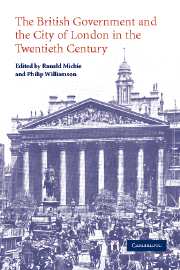Introduction
Published online by Cambridge University Press: 04 July 2009
Summary
The nature of the relationship between the government and the City of London, or more abstractly between ‘politics’ and ‘finance’, is a central issue in studies of modern Britain. The relationship is assumed to have been close and to have had wide repercussions, but thereafter disagreements have emerged. It is a problem in economic and financial history: to what extent has the relationship affected the performance and structure of the economy in general, and the development of its financial and industrial sectors in particular? It is a problem in political history and political science: have government and the City had shared or divergent interests? Which has been more powerful? Has government unduly constricted the City's financial markets, or has the City exerted excessive influence over the policy agenda and particular decisions? For imperial historians the question has been how far did City interests shape British overseas expansion and, later, the character of decolonisation? Historians of international relations have asked how far City interests have supported or conflicted with particular government foreign policies. The relationship is also an issue in social history and sociology: was there a significant merger of personnel and interest between the City's financial elite and the governing elites, at the expense of other socio-economic groups?
This book brings together political and financial historians to investigate the government–City relationship during the twentieth century, considered from various directions and by attention to revealing episodes.
- Type
- Chapter
- Information
- Publisher: Cambridge University PressPrint publication year: 2004



